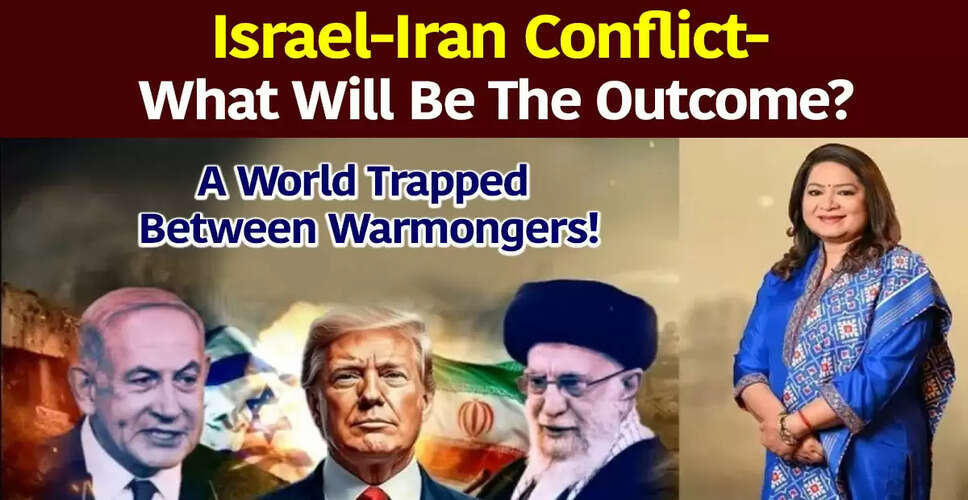Israel-Iran Tensions: A New Era of Conflict

Bharat Ek Soch:
On June 13, 2025, the global community was shaken by the emergence of a new conflict zone. The situation escalated when Israel launched an attack on Iran's nuclear and military facilities using approximately 200 fighter jets. In retaliation, Iran conducted airstrikes targeting Tel Aviv. Reports of explosions emerged from Tehran, while air raid sirens echoed in Jerusalem and Tel Aviv. The Israeli strikes resulted in the death of Hossein Salami, the commander of Iran's Islamic Revolutionary Guard Corps (IRGC), along with several senior military officials and nuclear scientists, including Mehdi Tehrani and Fereydoun Abbasi. The two nations are now embroiled in a direct confrontation, with no signs of de-escalation. Iran recognizes that Israel is merely a pawn in a larger game orchestrated by US President Donald Trump and his military leaders.
Rising Tensions and Global Implications
As tensions mount, Iran has raised a red flag over the Jamkaran Mosque in Qom, signaling its commitment to retaliate for the attacks. This situation raises critical questions about the global ramifications of the Israel-Iran conflict. Which nations will align with either side? India, maintaining strong ties with both Israel and Iran, faces a dilemma. Will Pakistan support Iran, or align with the United States? Is there a possibility of Pakistan compromising its relationship with China to appease America? The potential fallout for India in the event of a war between these two nations is significant.
The Middle East: A Powder Keg
The Middle East is often described as a region sitting on a powder keg, with the potential for tensions between Israel and Iran to escalate dangerously. While many anticipated that Israel might target Iran's nuclear facilities, few expected such a large-scale assault involving 200 fighter jets. The assassination of Iran's top military commander and nuclear experts was unforeseen.
Israel's Justification for Its Actions
In response to the attacks, Israeli Prime Minister Benjamin Netanyahu announced 'Operation Rising Lion,' aimed at dismantling Iran's nuclear capabilities, asserting that this mission is vital for the survival of Tel Aviv. Despite the geographical distance of over a thousand kilometers between Israel and Iran, the conflict's implications are profound. Understanding the motivations behind Israel's perception of Iran's nuclear program as an existential threat is crucial.
The Role of the United States
Despite being located 12,000 kilometers away, the United States is viewed as a key player in the escalating tensions between Iran and Israel. For decades, the US has sought to weaken Iran, which has been striving to develop nuclear capabilities. Washington fears that if Iran succeeds, it could pose a significant threat to Gulf nations, US military bases, and Israel. Recently, President Trump urged Iran to finalize its nuclear deal or face dire consequences, but Iran has yet to agree to US and Israeli demands. Defense analysts suggest that such a large-scale operation would be impossible without American support.
Iran's Response and Regional Dynamics
Iran has consistently retaliated against Israel with ballistic missile strikes. In October of the previous year, Iran launched around 181 ballistic missiles at Israel within a short span of 25 minutes. As a prominent nation in the Muslim world, Iran aims to unite Shia and Sunni Muslims against Western influence, a move that the US opposes.
Khamenei's Stance
Supreme Leader Khamenei has vowed that Iran will retaliate decisively against Israel, indicating that the nation will not yield to pressure. As the conflict intensifies, India's position becomes increasingly complex. India has historically maintained good relations with both Tehran and Tel Aviv, having received support from Israel during Operation Sindoor. The ongoing tensions pose diplomatic challenges for India, which must navigate its relationships carefully. A prolonged conflict could disrupt air travel to Europe and other regions, while rising oil prices and gold rates could have economic repercussions. Additionally, the situation poses risks for the approximately 9 million Indians residing in Gulf countries.
The US-Israel Alliance
In today's interconnected world, the impact of any conflict extends beyond borders. The repercussions of the Russia-Ukraine war and the Israel-Hamas conflict illustrate this reality. Just as the US supports Israel, Iran is believed to provide substantial support to groups like Hamas and Hezbollah. The Houthi fighters, for instance, could disrupt vital maritime trade routes. Amid the ongoing conflict, diplomatic relations may undergo significant changes.
Pakistan's Position
Another pressing question is Pakistan's stance in this evolving scenario. Currently, Pakistan's relationship with the US is improving, as America seeks to leverage Pakistani territory to strengthen its influence in South Asia and counter China. Meanwhile, Iran's ties with China have strengthened, positioning it as a key player in bridging relations between Arab nations and China. The Trump administration is also working to rebuild relationships with influential Arab states.
Turkey's Potential Support for Iran
As a Muslim-majority nation, Iran may garner support from other Muslim countries in its conflict with Israel. Turkey is likely to openly back Iran, while major Arab nations may opt for mediation rather than direct involvement. Chinese President Xi Jinping may align with Tehran, while Russian President Putin, currently engaged in the Ukraine conflict, may adopt a neutral stance. Ultimately, the Israel-Iran conflict is poised to have significant consequences for ordinary citizens.
